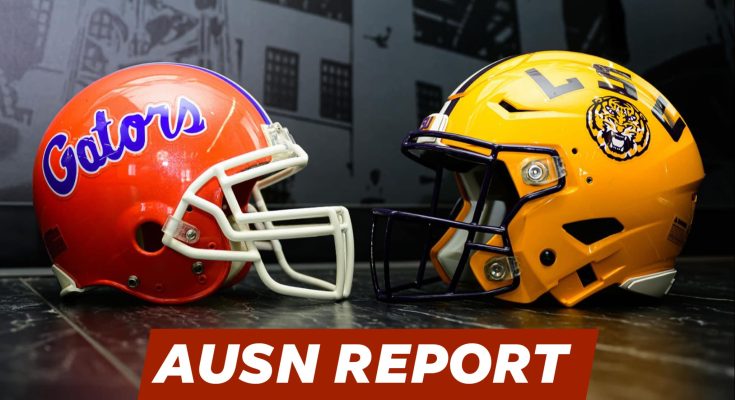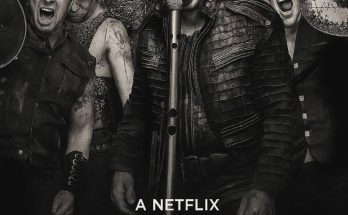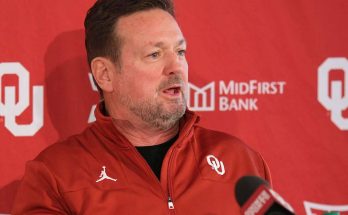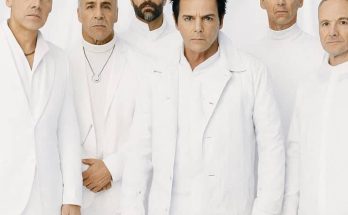There’s nothing like Saturday night in Death Valley when Florida comes to town. The moment you step off the bus, the thick Louisiana air hits you like a wall—humid, heavy, and electric. It clings to your skin, mixes with the smell of grilled boudin, spilled beer, and the faintest scent of bourbon sneaking out from tailgate cups. But it’s not just the weather. It’s something deeper, something primal, something sacred. The atmosphere in Baton Rouge on a Saturday night is more than noise, more than lights, more than the smell of hot jambalaya and the roar of 102,000 fans echoing through the swamp. It’s a pulse. It’s a heartbeat that stretches from Tiger Stadium to the Mississippi River. And when the Gators come to town, that heartbeat thunders.
There’s a mutual hatred between LSU and Florida that transcends distance. It isn’t born of geography like Alabama-Auburn or Ohio State-Michigan. It was forged in fire—Hurricane Katrina, postponed games, fights on the field, shoes thrown across the gridiron, and championships spoiled. It’s the kind of rivalry that doesn’t need proximity because it runs deep in the bone marrow of both fanbases. It’s not just about football—it’s personal. And on a Saturday night in Death Valley, it becomes something else entirely. Something dangerous.
All day long, the tension builds. Tailgaters set up as the sun rises, hours before kickoff. Pots of gumbo bubble beside RVs that haven’t moved in three days. The fans wear purple and gold like armor, drinking, laughing, talking trash. You hear the stories passed around like folklore—Billy Cannon’s run, the Earthquake Game, the Fog Bowl. Children who’ve never even been to a class at LSU can recount those moments like they lived them. They wear face paint and miniature helmets and chant “Geaux Tigers” like a war cry. And every time you hear someone yell “Tiger Bait,” it’s not just a taunt—it’s a declaration.
By mid-afternoon, the sun hangs low in the sky, casting golden streaks over the live oaks draped in Spanish moss. The streets around the stadium swell with purple-clad bodies, each one with a drink in hand and a story on their lips. There’s music—Cajun, country, and brass bands. Someone’s always frying something. The smell of fried catfish mingles with sweet cigar smoke, and you hear the occasional rumble of a distant cheer when someone mentions Tebow or Burrow. The tension isn’t nervous—it’s confident, almost cocky. Because in Baton Rouge, especially at night, LSU doesn’t lose. Not without a fight. And certainly not to Florida.
When you finally walk into Tiger Stadium, it doesn’t feel like you’re entering a football field. It feels like you’re stepping into an arena, a place where gods are born and legends go to die. The bleachers shake when the crowd stomps, and it’s not just noise—it’s seismic. The student section is already half-mad, waving towels and screaming things that probably shouldn’t be repeated. You look around and see faces painted like warriors, drunk on bourbon and belief. They don’t care who’s starting at quarterback. They don’t care if it’s raining or if Florida’s ranked higher. They believe. And in this place, on this night, that belief is fuel.
The visiting team always enters to a chorus of boos, but when it’s Florida, it’s different. It’s visceral. It’s venomous. The stadium collectively remembers the cheap shots, the last-minute wins, the canceled games. They remember the taunts from Gator players, the cocky grins, the mocking gestures. They remember being looked down on by the blue and orange faithful. And they don’t forget. LSU fans carry that grudge like a badge of honor. So when the Gators take the field, it’s like watching an enemy army march into a storm they can’t quite see coming.
And then, when the sun finally dips below the horizon and the lights come on, Death Valley comes alive. The sound changes—gets deeper, louder, meaner. The announcer booms through the speakers, and the band strikes up those first few notes of “Pregame.” The Golden Band from Tigerland marches out with precision, their white uniforms gleaming under the stadium lights, and the crowd swells. The drumline pounds through your chest. The flags whip through the air. It’s not just a show—it’s ritual.
When the Tigers run onto the field, the place erupts. Fireworks light up the sky, and the scoreboard shakes. You can’t even hear the person next to you anymore. It’s just noise, raw and full. It’s like the entire state of Louisiana is in that stadium, screaming as one voice, daring Florida to step foot in their house. The air practically crackles with energy. You can feel it in your bones, like thunder rumbling just beneath the skin. No place in college football feels like this—not at night, not with this kind of history on the line.
The game itself never disappoints. It doesn’t matter what the records are. Every time LSU and Florida meet, it turns into a war. Big hits. Turnovers. Trick plays. Fights. There’s blood, there’s sweat, there are flags flying and coaches screaming. You can see it in the players’ eyes—this one means more. Every down is played like it’s the last. The fans react to each play like life depends on it. A short gain? Cheers. A first down? Roars. A touchdown? Earthquake.
And it goes both ways. Florida doesn’t back down. They hate LSU just as much, and they play like it. The Gators bring speed, swagger, and scars from past matchups. They’ve stolen wins in Tiger Stadium before—and they’ve paid for them. But every time they come back, it’s another chance to take control of the rivalry. To silence the crowd. To spit in the eye of tradition.
But Death Valley doesn’t silence easily.
There’s always a moment in the second half—maybe it’s a huge stop on third down, maybe it’s a punt return, maybe it’s a game-changing interception—where the stadium takes over. It becomes sentient, roaring with a voice so loud it feels like the walls of the universe might collapse in on themselves. Coaches have to scream to be heard. Players communicate with hand signals. Florida’s offense stutters, and LSU feeds off it like a predator smelling blood. The crowd becomes the twelfth man, then the thirteenth, then the fourteenth. They’re not just watching the game—they’re influencing it.
You can feel momentum swing like a pendulum, and when LSU gets the upper hand, it’s not just a shift in points—it’s a storm bearing down. Everything feels faster, louder, meaner. When LSU scores, the band explodes into “Tiger Rag,” and the stadium nearly levitates. Grown men weep. Children scream. Students throw their arms around strangers and sing the fight song like it’s a hymn. The emotion is unfiltered, pure, ancestral. It’s not just about beating Florida. It’s about defending the Valley. It’s about honor.
And when the clock ticks down to zero—no matter who wins—everyone knows they’ve seen something real. The bruises last for weeks. The noise echoes for days. And even the losers know they’ve been a part of something bigger than football. Something tribal. Something spiritual. A game played under the lights, fueled by history, rage, pride, and unrelenting noise.
Walking out of Tiger Stadium after a win over Florida, the crowd doesn’t just celebrate. They erupt. The streets are alive again—horns honking, chants rolling through the air, fireworks popping off in parking lots. People dance. People cry. People drink like they just reclaimed something sacred. They relive every play, every hit, every moment that made them scream themselves hoarse. And even if they don’t remember every detail tomorrow, they’ll remember how it felt. The way the ground shook. The way the lights flickered. The way it all came together in one of the most electric environments in sports.
There’s nothing like it.
Saturday night in Death Valley isn’t just a tradition. It’s a reckoning. And when Florida comes to town, it becomes a storm. It’s where boys become men, legends are made, and grudges are settled. You don’t just witness it. You survive it. You feel it in your soul.
And once you’ve felt that—once you’ve stood in that noise, in that heat, in that madness—you know: there truly is nothing like Saturday night in Death Valley when Florida comes to town.



